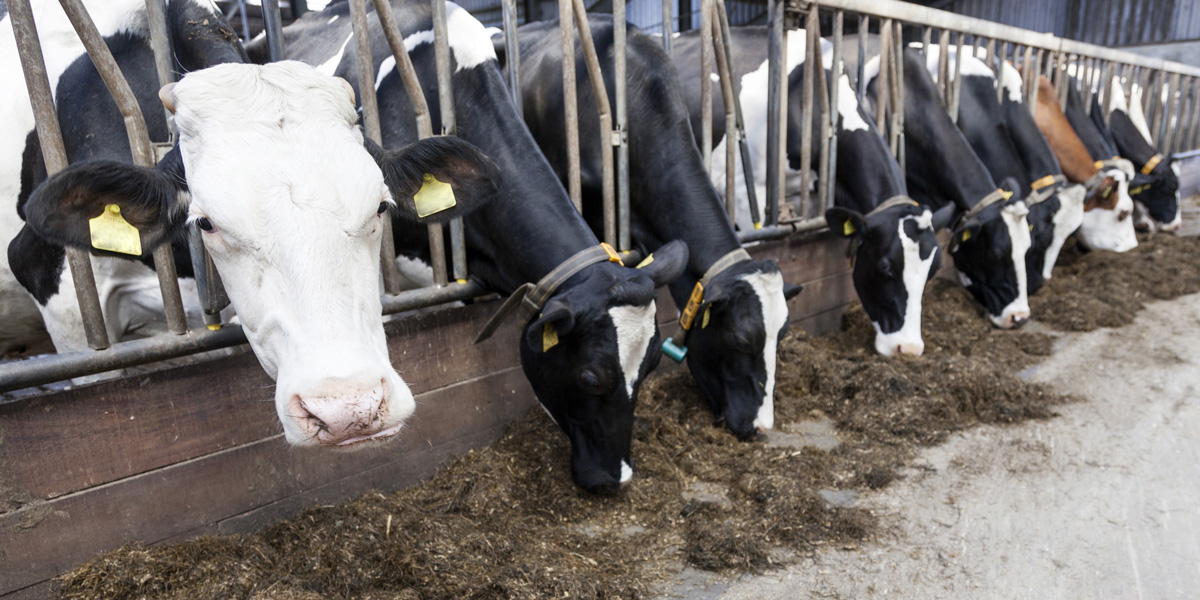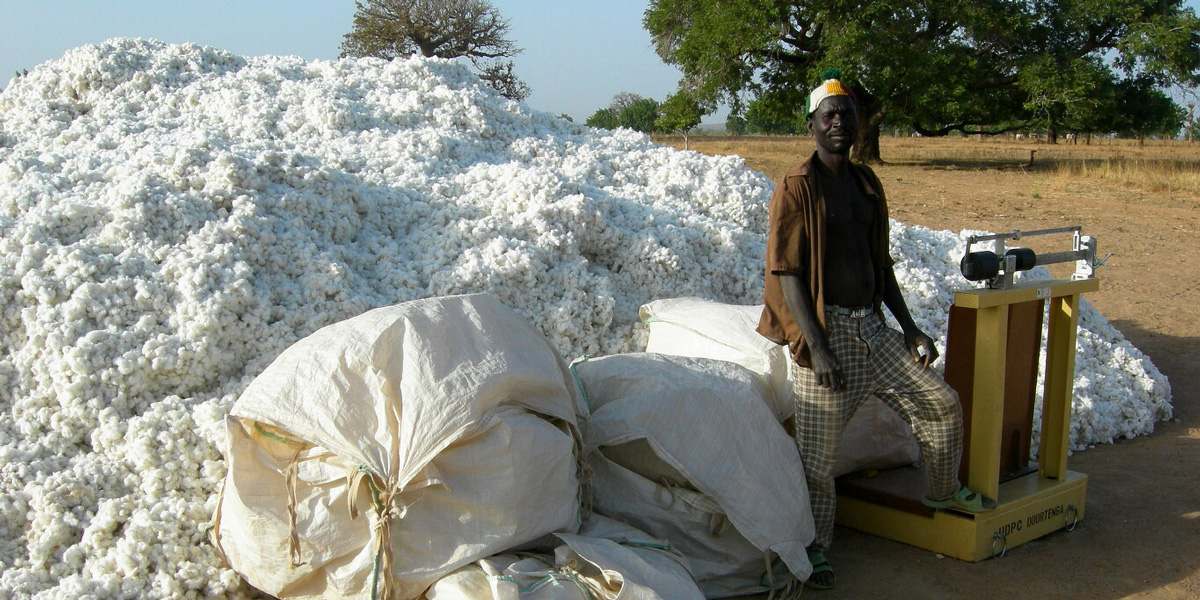First commercialized GM Bt maize was toxic to animals over the long term
Scientific data and farm records indicate that the first commercialised GM maize, Syngenta’s Bt176, was probably toxic to dairy cows over the long term. The data are analysed in a new peer-reviewed paper by Prof GE Seralini and the affected farmer, Gottfried Glöckner. Symptoms that appeared in the cows following the introduction into the diet of the GM maize included paralysis and death.
Burkina Faso abandons GM Bt cotton
In a move that could help decide the future of GM crops in Africa, Burkina Faso has abandoned GM Bt cotton. The country has begun a complete phaseout of the crop, citing the inferior lint quality of GM cultivars. The authors of an important paper on the development, Brian Dowd-Uribe and Matthew Schnurr, explain the lessons to be learnt from Burkina Faso’s experience.
Mining banana biodiversity to reduce vitamin A deficiencies in East Africa
The Gates Foundation-funded Bioversity International is investigating naturally beta-carotene rich bananas as a solution to vitamin A deficiency. There are plenty such bananas – showing that the GM beta-carotene-enriched banana that’s being trialled at Iowa State University is not needed.
WTF happened to golden rice?
Like the hover boards of the Back to the Future franchise, golden rice is an old idea that looms just beyond the grasp of reality, writes Tom Philpott. A decade and a half since an article in Time claimed the rice “could save a million kids a year”, it has yet to be planted commercially – but it continues generating bumper crops of hype. Philpott, environmental anthropologist Prof Glenn Davis Stone, and writer and academic Raj Patel discuss the topic in an educational and entertaining podcast.
Bangladeshi farmers abandon GM Bt brinjal
New farmers have been recruited to keep Cornell University’s failed Bt brinjal project on the rails as farmers who previously grew the crop are not interested in repeating the experience.
India: Explain move to introduce GM mustard, Supreme Court asks government
India’s Supreme Court has sought an explanation from the central government on its proposed move to introduce GM mustard, cotton and corn in the face of a court-imposed ban on their introduction.
Indian government admits Bt cotton failure
The efficacy of GM Bt cotton in resisting pest attacks has declined, the central government told the Delhi high court. As a result, royalties charged by a technology giant like Monsanto must also come down, it argued.
India: Haryana, Punjab may cut Bt cotton sowing
Farmer suicides in Punjab and Haryana after extensive pest damage to the cotton crop in 2015-16 has led to a swing in official opinion against GM Bt seeds. A committee appointed by the state governments to investigate is recommending a return to native varieties with better resistance to pests and disease.
Major pullback from GM by BASF
BASF has halved its biotech workforce, closed test sites in Hawaii, India, and Puerto Rico, and cut its GMO portfolio. It seems as if BASF may have realized that it has been betting on a losing horse with the GM approach.
Argentine town demands protection from pesticides
Residents in an Argentine town surrounded by GM soy are demanding protection from sprayed pesticides.
Monsanto blockade in Malvinas, Argentina enters third year
Protesters have successfully blocked a seed-processing plant in Malvinas, Argentina for over two years. Ciara Low spent three weeks living with the blockaders, and wrote an exclusive account of their struggle for GMWatch.
Brussels biotech lobby's last push for gene editing technologies to escape regulation
Biotech corporations have invested billions in a range of new “GM 2.0” technologies designed to redesign the world's germplasm and create new generations of GMOs. And powerful investors have no intention of letting tedious EU regulations get in the way of the profits they are now poised to reap – no matter what the laws actually say.
Scientists warn over glyphosate herbicide risks
Fourteen scientists have published a consensus statement expressing concern over the health risks of exposure to glyphosate-based herbicides such as Roundup. The scientists say that the supposed safe limits for glyphosate set by regulators are based on outdated science.
Glyphosate health risks ignored as European Commission proposes long reapproval for use in EU
The European Commission is proposing the reapproval of glyphosate for use in the EU for a further 15 years, until 2031.
Sixty-six MEPs demand that glyphosate is not re-approved
Sixty-six Members of the European Parliament (MEPs) have written to Vytenis Andriukaitis, the European Commissioner for Health and Food Safety, to request that glyphosate is not re-approved in Europe. The MEPs cite a lack of transparency in the re-approval process as well as serious health concerns.
Co-formulants of glyphosate herbicides are endocrine disruptors
A new study shows that the acceptable daily intake (ADI), the supposedly safe level, for glyphosate is unreliable in terms of assessing the risks of the complete commercial formulations that we are actually exposed to. That’s because the co-formulants and complete formulations were shown to have a far more powerful endocrine-disrupting effect at lower doses than the isolated active ingredient, glyphosate.
US: Glyphosate use must be addressed if we are to save the monarchs
Thousands of acres of milkweed, the monarch butterfly larvae’s only food plant, will be planted in the spring. But environmental groups say the focus on habitat isn’t enough. The use of glyphosate herbicides, which kill milkweed in GM crop fields, must be curtailed.
Glyphosate most heavily used weedkiller in history, study says
Glyphosate is now the most widely and heavily applied weedkiller in the history of chemical agriculture in both the US and globally, according to a report published in the journal, Environmental Sciences Europe. GM crops account for 56% of global glyphosate use.
Glyphosate turns up in German beer
Glyphosate weedkiller – a probable carcinogen, according to the World Health Organisation’s cancer agency IARC – was found in all of the 14 most sold beers in Germany.
Organic panty liners recalled for containing traces of glyphosate
More than 3,000 boxes of organic panty liners have been pulled from shop shelves in France and Canada after they were found to contain traces of glyphosate weedkiller.
US court clears way for Enlist Duo herbicide
A court decision has handed a victory to Dow Chemical's efforts to revive a World War II-era weedkiller and brought the next generation of GM crops closer to America's dinner tables. The 9th US Circuit Court of Appeals rejected the US Environmental Protection Agency's request to vacate its own scientists' 2014 approval of the Dow weedkiller known as Enlist Duo.
Ombudsman finds European Commission guilty of maladministration over pesticides
The practice of EU Commission health service SANTE of approving pesticides while important safety data are missing, the so-called “confirmatory data procedure” (CDP), is a case of maladministration, according to the EU Ombudsman.
UK: The “secret conspiracy to force us all to eat GM food”
Most of the meat that people eat comes from animals reared on GM feed – it’s a case of a rejected technology sneaking in through the back door.
US: Senate bill would block mandatory GMO labelling
A Senate committee is moving forward on legislation that would prevent states from requiring labels on GM foods.
Why Hillary Clinton's deep ties to Monsanto are giving US voters serious heartburn
US presidential hopeful Hillary Clinton’s ties with Monsanto continue to give US voters serious concern about what a second Clinton administration would do regarding the growing movement in America to label GMOs.
US FDA bans imports of GM salmon – for now
The Food and Drug Administration has issued a ban on the import and sale of GM salmon until the agency can publish guidelines for how it should be labelled.
US mulls boosting imports as sugar refiners face GMO-free supply crunch
The US government is considering boosting raw sugar imports as refiners face a supply crunch due to a trade spat with Mexico and rising cane demand as food makers use less GM ingredients, company and government officials said.
Canadian fruit growers say no to GM Arctic apple
Fruit growers in British Columbia are planning to ask the government to de-register the GM Arctic Apple until further studies are done.
Russian paper does not show safety of GMOs
In January 2016 an editorial by Russian scientists was published in Critical Reviews in Biotechnology, declaring that previously published GMO safety studies have found no evidence of harm to living organisms. In response, Russia’s National Association for Genetic Safety (NAGS) has released a statement signed by prominent scientists and activists, explaining why this paper does not confirm the safety of GMOs.
ChemChina offers over $43 billion for Syngenta
China National Chemical Corp., a state-backed company, has agreed to buy Swiss pesticide and GM seeds firm Syngenta for more than $43 billion in cash.
South American doctors name larvicide as potential cause of microcephaly
A report by the Argentine doctors’ association, Physicians in the Crop-Sprayed Towns, names a mosquito-killing larvicide, pyriproxyfen, as a potential cause of the reported increase in the birth defect microcephaly in Brazil. Contrary to rumours, the cause is unlikely to be GM mosquitoes.
Zika, microcephaly, and pesticides: Half-truths, hysteria, and vested interests
People who think pesticides might have something to do with the microcephaly outbreak in Brazil are being attacked as irrational conspiracy theorists. Claire Robinson takes a closer look at who’s peddling the myths.
What did Brazilian public health researchers really say about Zika, pesticides, and birth defects?
Claire Robinson looks at a Brazilian public health organization’s reported denial of a link between pesticides and microcephaly.
 How Prof Bruce Chassy collaborated on a Monsanto PR campaign
How Prof Bruce Chassy collaborated on a Monsanto PR campaign
Food and agriculture journalist Carey Gillam exposes how the front man of the Academics Review website and supposedly independent expert Bruce Chassy worked hand-in-glove with Monsanto to spin GM crops and their associated pesticides to the public.
Genetic Literacy Project accused of unethical practices
The Genetic Literacy Project (GLP) has been accused of unethical journalistic practices after it published personal information about individuals opposed to GM food and changed the text of an article without the author’s permission.
How GMOs are defended by distorting the facts
Steven M. Druker, JD, public interest attorney and author of Altered Genes, Twisted Truth, exposes the fictions fostered during the discussion with GMO proponent Robert Wager on TVO’s “The Agenda”.











